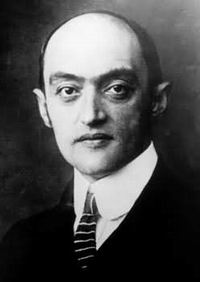 A product of the waning years of the Austro-Hungarian Empire, Joseph A. Schumpeter exemplified that heritage. Although a student of Eugen von Böhm-Bawerk and Friedrich von Wieser, Schumpeter was never really a footsoldier of the Austrian School.
A product of the waning years of the Austro-Hungarian Empire, Joseph A. Schumpeter exemplified that heritage. Although a student of Eugen von Böhm-Bawerk and Friedrich von Wieser, Schumpeter was never really a footsoldier of the Austrian School.
After a quick doctorate at Vienna, Schumpeter roamed about as something of a footloose lawyer until he rejoined academia in 1909. It was while he was teaching at Czernowitz (now in the Ukraine) that he wrote his Theory of Economic Development (1911), where he first outlined his famous theory of entrepreneurship. He argued those daring spirits, entrepreneurs, created technical and financial innovations in the face of competition and falling profits – and that it was these spurts of activity which generated (irregular) economic growth.
His second book (1914) he finished while at Graz when World War I broke out – which Schumpeter opposed. After the war, Schumpeter joined the German Socialization Committee in Berlin – which then was composed of several Marxian scholars (such as Hilferding and Kautsky) and the Kiel School economists (such as Lowe and Lederer).
In 1919, Schumpeter became the Austrian Minister of Finance – unfortuantely, presiding over the hyperinflation of the period, and thus was dismissed later that year. After a brief teaching stint at Graz, Schumpeter migrated in 1921 to the private sector and became the president of a small Viennese banking house. However, his bank collapsed in 1924. He drifted once again back into academia – taking up a teaching position at Bonn in 1925.
In 1932, Schumpeter took up a position at Harvard, succeeding the Marshallian F.W. Taussig. He was joined by Alvin Hansen, Wassily Leontief, Richard Goodwin, Paul Sweezy, John Kenneth Galbraith and fellow Austrian, Gottfried Haberler. Schumpeter ruled Harvard during the period of the “depression generation” of the 1930s and 1940s – when Paul Samuelson, James Tobin, Tsuru, Heilbroner, Henri Bergson, Metzler, etc. were his students.
Although excelling as a teacher above everything, Joseph Schumpeter nonetheless completed three more books while at Harvard: his didactic Business Cycles (1939), his popular Capitalism, Socialism and Democracy (1942) – in which he famously predicted the downfall of capitalism in the hands of intellectuals – and his encyclopedic, History of Economic Analysis (1954). In the first two, he expanded upon his theory of entrepreneurship and theory of growth into a wider theory of the development of capitalism, integrating it into a business cycle theory and a theory socio-economic evolution.
Schumpeter’s legacy is difficult to assess. Although an enthusiast of Leon Walras and the Lausanne School, he contributed little to it beyond praise. Although he had contributed to the Methodenstreit against the German Historicists and on behalf of Menger, the other Austrians had long written him off as one of the faithful – and his old Marxian comrades of Berlin and Vienna certainly did not regard this man with conservative instincts as a fellow traveler.
Like Frank Knight, Schumpeter remains unclassifiable in our schema. Consequently, we give him the honor of founding “evolutionary” economics, given his concern with economic change brought about by the interaction between individuals and the economy as a whole, a concern with socio-economic history and institutions, but not enough to overshadow his search for an inherently theoretical explanation for the development of capitalism.
Major works of Joseph Schumpeter
– The Theory of Economic Development
– Business Cycles and Socialism and Democracy

Hiya, I am really glad I have found this information. Today bloggers publish just about gossips and net and this is actually frustrating. A good site with interesting content, this is what I need. Thanks for keeping this web site, I’ll be visiting it. Do you do newsletters? Can not find it.
Usually I do not read article on blogs, however I wish to say that this write-up very pressured me to try and do it! Your writing taste has been surprised me. Thank you, very nice article.|
It’s very effortless to find out any matter on web as compared to textbooks, as I found this paragraph at this web site.|
I read this post fully regarding the difference of hottest and previous technologies, it’s remarkable article.|